
Ask almost any health professional—doctor, nurse, pharmacist, registered dietician—about the elements of good health and you will likely hear this mantra: exercise, do not smoke, get a good night’s sleep, manage stress and eat a well-balanced diet.
We cannot argue with this advice. The experts we have interviewed over the last 40+ years agree that almost any kind of exercise is beneficial. They are also unanimous that smoking is bad. A good night’s sleep is defined simply as sleep that is restful and allows you to awake refreshed.
Stress management is a bit complicated and differs from one person to the next. Where the pillar of good health crumbles is with the advice to “eat a well-balanced diet.”
What Is a Well-Balanced Diet?
What do health professionals mean by a “well-balanced diet”? There are so many diets that we have lost count: Atkins, DASH, Mediterranean, South Beach, Jenny Craig, Ornish, Nutrisystem and Weight Watchers. That’s just for starters. Then there are Keto diets, Paleo diets and Raw Veggie diets. The list goes on and on.
Vegetables As the Main Course!
Many health professionals, when pushed for details about a well-balanced diet, would tell you to eat your vegetables. Some quickly add “other than potatoes.”
That’s an important qualifier, since potatoes are by far the most popular vegetable in North America, followed by tomatoes (think ketchup and pizza). (Some people actually think that putting ketchup on their French fries solves their vegetable quotient for the day.) Onions and carrots trail next, but far behind.
Vegetables and a Well-Balanced Diet!
Why the emphasis on vegetables? For one thing, research supports it. Scientists have studied the DASH diet extensively and rigorously. People who follow this diet emphasizing vegetables, fruits, whole grains, beans and low-fat dairy have lower blood pressure (Advances in Nutrition, Sep. 1, 2020).
In addition, such a diet may also benefit people with heart failure (Nutrients, Dec. 10, 2021), diabetes (Nutrients, Sep. 6, 2020) and high uric acid, a risk factor for gout (Clinical Rheumatology, June 2017).
DASH is not the only health-promoting dietary pattern that emphasizes vegetables. Mediterranean diets, which come in many varieties, are also rich in vegetables and fruits, whole grains, flavorful herbs and olive oil. Traditional Mediterranean foodways have very little sugar or meat, emphasizing fish and legumes as protein sources instead.
People following one of these traditional Mediterranean diets are less prone to cancer (Nutrients, Sep. 2, 2019), cardiovascular and neurodegenerative disease and bone loss (Nutrients, June 12, 2021). Other plant-based diets have also been linked to healthy aging.
Your Microbiome Loves a Well-Balanced Diet:
Probably one reason a diet rich in veggies benefits health so broadly is its effect on the microbiome. The microbes that inhabit our intestines and guide our immune system love fiber (Cell Host & Microbe, March 10, 2021). Since many plants are a great source of fiber, eating a wide range of veggies, berries, fruits, legumes, seeds and whole grains is a good strategy.
Let’s Get Specific!
We hate it when one of our expert radio show guests says something like “eat your vegetables.” That’s why we often try to pin that person down by asking what we would find in their shopping cart or refrigerator.
You deserve the same the same thing! Our list of favorite vegetables is long enough to allow for plenty of variation day to day. We don’t get bored, and you shouldn’t either. Here are some of our best veggies:
Artichokes
Asparagus
Beet greens (collards and mustard greens are good too)
Bell peppers
Bokchoy
Broccoli (and variants like broccolini)
Brussels sprouts
Cabbage
Carrot
Cauliflower
Celery
Cucumber
Eggplant
Endive
Escarole
Green beans
Kale
Leeks
Lettuce
Mushrooms
Okra
Onion
Pumpkin
Radicchio
Scallions
Snow peas
Spaghettis quash
Spinach
Sweet potato
Swiss chard
Tomato
Zucchini
Fruits can also contribute dietary fiber and beneficial colorful compounds called flavonols. Some of our favorites include:
Blackberries
Blueberries
Raspberries
Strawberries
Cherries
Currants
Grapefruit
Orange
Tangerine
Kiwi
Mango
Pineapple
and stone fruit such as
Apricots,
Peaches
Plums when they are in season.
A Well-Balanced Diet!
If you concentrate on eating several things from these lists every day and choosing a protein source that is not highly processed or fried, you’ll be well on your way to building a healthful well-balanced dietary pattern. Minimizing white carbohydrates like flour and sugar is also a crucial step.
You can learn more about turning these ingredients into delicious meals in our book, Recipes & Remedies From The People’s Pharmacy. If your public library does not have a copy, you can find it in the store at this link.

